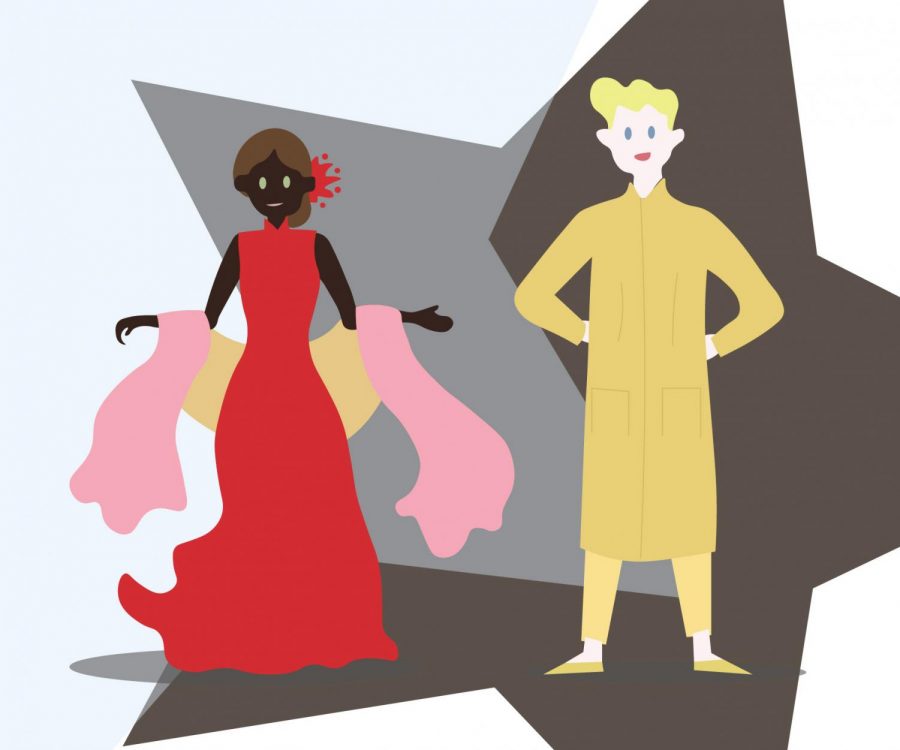‘Don’t be a jerk’ about cultural appropriation
Some people of color are indifferent to cultural Halloween costumes
Most of us have a fascination with different cultures and their traditions, but when does appreciation become impolite?
October 28, 2021
I would say that in the fight for cultural awareness in America, we have made a ton of progress.
Granted, there are still issues. Stigmatization is present in certain institutions, and not everyone is represented fairly. For example, there is still a lack of cultural representation in the national government.
But in comparison to even 20 years ago, we are collectively doing better as a society. Different cultures are (mostly) represented better in visual media, and school campuses are pushing for cultural inclusivity by forming student organizations specifically tailored to different groups.
One slippery slope, however, is cultural appropriation.
Cultural appropriation is defined as taking elements from a heritage you do not belong to and using them as if they were your own. While everyone has different criteria on what counts as cultural appropriation, the most brought up example is clothing.
The reason why cultures find it offensive when people outside their culture wear their traditional clothing is simple: the person in question is likely wearing it for “fun” or “because it looks pretty” rather than appreciating the actual meaning behind it.
This is especially the case during Halloween: a festivity specifically dedicated to dressing up for fun and fantasy. It seems harmless on the surface, but it can cause some huge issues.
A burka costume can come off as offensive to Muslim women because it is religious headwear that has been forced on them in certain examples. A hanfu costume can annoy Chinese individuals because it takes away a piece of their history and reduces it to entertainment.
It is important to note, however, that not everyone feels this way about cultural appropriation, even when it comes to Halloween.
Tyler Chu, freshman mechanical engineering major, is a Chinese-American student who identifies with some aspects of his heritage but strongly identifies with American culture.
“As a kid, Chinese was my first and main language,” Chu said. “But over time, I became more ‘American’ than Chinese because English replaced Chinese as my main language to the point in which I had to go back to Chinese school to relearn it.”
In Chu’s opinion, he does not care if other people wear Chinese clothing for Halloween. However, he said that costumes depicting other cultures are designed poorly.
“I think the problem with costumes depicting things of different cultures isn’t that they exist; it’s that they depict things in the Western point of view,” he said.
One example he gave was of a ninja and how the western portrayal of a ninja is nothing close to how a ninja would actually look.
Denise Tanumihardja, sophomore computational neuroscience major, is also not bothered by the idea of people wearing traditional clothing. Tanumihardja is an Indonesian student who practices his culture with other Indonesian students.
“I’d be cool with it if they don’t be a jerk about it,” he said. “Personally, I’d be delighted to see people wear [Indonesian clothing] and don’t mind if they go for that exotic or fantasy or exotic-fantasy vibe as long as they understand and know its origin.”
His opinion is both for Halloween costumes and even occasions where people would wear such clothing for fun.
Junior marketing major, Nick Halden, identifies as half Japanese and half American and has close ties to both cultures. He finds the idea of suggesting Halloween costumes as cultural appropriation absurd.
“Halloween costumes are not meant to be serious and are a comedic thing,” he said.
Halden said that some years he might wear costumes resembling American movie characters or cowboys.
“Would that be cultural appropriation? Is that disrespectful to the heritage of white Americans? This isn’t something that has ever been a big deal until recently, and it shouldn’t be found offensive considering the ridiculous context of the holiday, Halloween,” Halden said.
I think when it comes to Halloween costumes imitating other cultures, people should read the room. Like Chu, Tanumihardja and Halden, you are going to encounter people who do not care if you incorporate aspects of their cultures into your entertainment for the holiday.
But it is important to recognize that not everyone is going to feel that way. There are going to be people who will not appreciate the idea of you dressing like that, and it is crucial to be sensitive to those individuals.
It makes sense why so many of us have taken to dressing up in clothing from different cultures as the vast majority of American culture comes from other cultures. For example, today’s pop culture features things like anime and Korean pop music. None of these things are inherently American.
And that is okay. I think there is a fine line between enjoying a culture and blatantly stealing from it. Appreciating the uniqueness of how a certain country makes their music is one thing, but visually portraying yourself as a member of a culture by using their clothes might carry some consequences.
When choosing a Halloween costume, make sure to keep cultural awareness in mind. Understand the origin and purpose of what you are representing and consider the potential reactions of those around you.
As you can see, there are people who do not mind cultural Halloween costumes. It is not a matter of ditching a costume idea but rather a matter of who is going to see that costume.
Because while you might encounter people of color who support the idea of you dressing up as different cultures, you will not always avoid people who will take offense to your costume choices. Being cautious of that can help you avoid accidentally offending anyone later.










